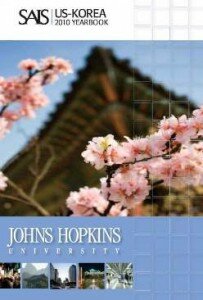2010 SAIS U.S.-Korea Yearbook
 The 2010 Edition of the SAIS U.S.-Korea Yearbook analyzes important developments in North and South Korea that characterized their relations in that year. Each paper was written by a SAIS student from the course, “The Two Koreas: Contemporary Research and Record,” in the fall of 2010. Their insights were based on extensive reading and study as well as on numerous interviews conducted with government officials, scholars, NGO workers, academics and private sector experts both in Washington and Seoul.
The 2010 Edition of the SAIS U.S.-Korea Yearbook analyzes important developments in North and South Korea that characterized their relations in that year. Each paper was written by a SAIS student from the course, “The Two Koreas: Contemporary Research and Record,” in the fall of 2010. Their insights were based on extensive reading and study as well as on numerous interviews conducted with government officials, scholars, NGO workers, academics and private sector experts both in Washington and Seoul.
This Yearbook is divided into four chapters: Security and Alliance Politics; Trade and Development; Government and Business; and Identity and Society.
Student authors featured: Jeremy Chan, Kate Chekan, Narae Choi, Rob Folley, Kristen Handley, Regina Kim, Soo Kook Kim, Jeanneatte Lee, Andrew Noh, Lubomir Sokol.
Download the full report here: 2010 SAIS U.S.-Korea Yearbook. Or click on the links below for individual papers.
Learn more about the Korea Studies Program at SAIS.
The Incredible Shrinking Crisis: The Sinking of the Cheonan and Sino-Korean Relations
When the South Korean naval ship Cheonan sank on March 26, 2010, under much speculation over a North Korean torpedo attack, so too did the hopes of many South Koreans for [Read More]
Realism and Liberalism in Economic Sanctions: An Analysis of South Korea's Sanctions on Iran in 2010
After the United Nations Security Council (UNSC) adopted UNSC Resolution 1929 in June 2010 against Iranian support of terrorist groups, the United States individually asked South [Read More]
The Lightbulb or the Bomb? The Politics of Nuclear Spent Fuel in South Korea
The importance of nuclear power plants is growing apace in South Korea and the Lee Myung-bak government is eager to expand its study of cutting-edge nuclear technologies tied to [Read More]
Another Korean FTA with Latin America: ¿Sí o No?
Historically, South Korea and Latin American countries have not been major trading partners. However, several political, social, and economic developments in the past 10 years [Read More]
Korea’s ODA to Africa: Strategic or Humanitarian?
South Korea’s growing economy, expanding role on the global stage, and history of rapid development, have made it an increasingly important provider of international aid and [Read More]
Korea and the Great Recession: The Effects of Chaebol Reform on South Korea’s Recovery from the 2008 Financial Crisis
While South Korea was equally as affected by the global financial crisis as its Western counterparts, the nation’s economy recovered much more quickly. Why did this happen? Was [Read More]
FDI in Korea: The Permanent Achilles’ Heel?
The South Korean economy stands as a model for many developing countries around the world. Not only did it rise up from the ashes of the Korean War and survive the 1997 Asian [Read More]
Sustaining Medical Tourism in South Korea
South Korea’s breakthrough in the medical tourism industry launched during 2007 with 16,000 foreign patients. In the year 2010, 60,000 foreign patients are expected to travel to [Read More]
Searchers and Planners: South Korea’s Two Approaches to Nation Branding
South Korea, an economically advanced and highly modernized country that suffers from an undeservedly weak national brand, has been eagerly pursuing various measures to improve [Read More]
The North Korean Refugee Policy of the Lee Myung-bak Government: Nationalism and Multiculturalism
The expanding population of North Korean refugees in South Korea presents a challenge to policymakers in Seoul. North Korean refugees are in many ways cultural outsiders, often [Read More]

